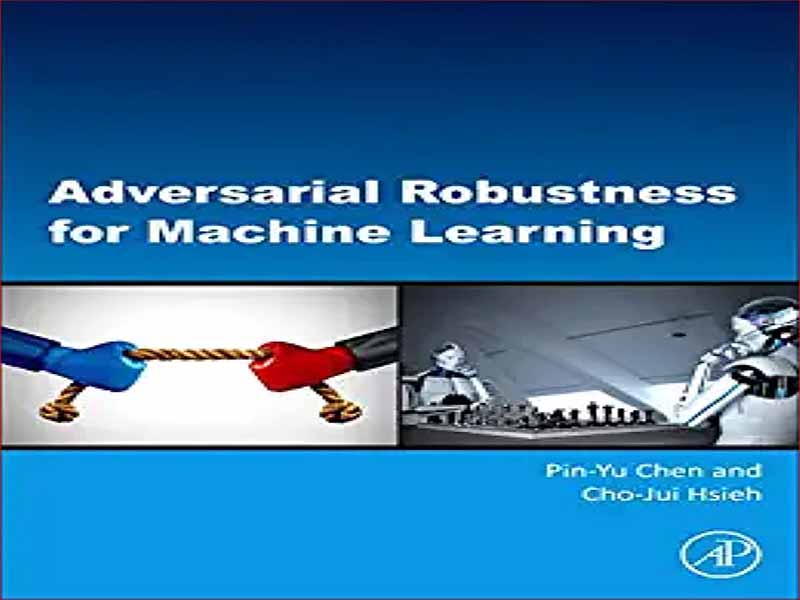- عنوان کتاب: ADVERSARIAL ROBUSTNESS FOR MACHINE LEARNING
- نویسنده: PIN-YU CHEN
- حوزه: یادگیری ماشین
- سال انتشار: 2023
- تعداد صفحه: 276
- زبان اصلی: انگلیسی
- نوع فایل: pdf
- حجم فایل: 10.1 مگابایت
با پیشرفتهای اخیر در تئوری و الگوریتمهای یادگیری ماشین، طراحی مدلهای با ظرفیت بالا و مقیاسپذیر مانند شبکههای عصبی، مجموعه دادههای فراوان و منابع محاسباتی کافی، یادگیری ماشین (ML) یا به طور کلی، هوش مصنوعی (AI)، باعث شده است. صنعت و جامعه ما را با سرعتی بی سابقه متحول کرده است. در حالی که ما در حال پیشبینی تأثیرات مثبت فناوری یادگیری ماشین هستیم، اغلب ممکن است اثرات منفی بالقوه را نادیده بگیریم، که ممکن است نگرانیهای اخلاقی قابلتوجهی را به همراه داشته باشد و حتی به دلیل مقررات قانونی و شکستهای فاجعهبار، بهویژه برای وظایف تصمیمگیری حیاتی و پرمخاطره، مشکلاتی را به همراه داشته باشد. بنابراین، فراتر از دقت، یادگیری ماشینی قابل اعتماد آخرین نقطه عطف برای دستیابی و پیشرفت فناوری مبتنی بر ML است. یادگیری ماشینی قابل اعتماد شامل مجموعه گسترده ای از موضوعات ضروری مانند استحکام رقیب، انصاف، توضیح پذیری، مسئولیت پذیری و اخلاق است. این کتاب بر انجام تلاش برای ارزیابی، بهبود و استفاده از قدرت رقیب الگوریتمها، مدلها و سیستمهای یادگیری ماشین به سمت نسخههای بهتر و قابل اعتمادتر تمرکز دارد. بهرهبرداری از یادگیری ماشینی غیرقابل اعتماد به عنوان آسیبپذیری، دروازههای بدون مراقبت را برای طرفهای مورد نظر ایجاد میکند تا پیشبینیهای ماشین را دستکاری کنند و در عین حال از توجه انسانها برای به دست آوردن مزایای خود دوری کنند. مهم نیست که در ML چه نقشی دارد، بهعنوان توسعهدهنده مدل، سهامدار یا کاربر، ما معتقدیم که برای همه ضروری است که قدرت رقیب را برای یادگیری ماشین درک کنند، درست مانند دانستن تواناییها و محدودیتهای وسیله نقلیه خود قبل از رانندگی. برای توسعه دهندگان مدل، ما از تست استحکام داخلی مدل ها و سیستم های خود برای بازرسی خطا و کاهش خطر حمایت می کنیم. برای ذینفعان، ما از اذعان به ضعفهای احتمالی در محصولات و خدمات، و همچنین ارزیابی صادقانه و کامل ریسک و تهدید به روشی آیندهنگر برای جلوگیری از کاهش درآمد/شهرت و آسیب فاجعهبار به جامعه و محیطزیست حمایت میکنیم. برای کاربرانی که از محصولات جانبی یادگیری ماشین استفاده میکنند، ما از درک فعال محدودیتهای آنها برای استفاده ایمن و کسب آگاهی در مورد سوء استفادههای احتمالی حمایت میکنیم. این جنبه های مربوط به استحکام خصومت، همراه با تکنیک ها و ابزارهای موجود، در این کتاب توضیح داده شده است.
With the recent advances in machine learning theory and algorithms, the design of high-capacity and scalable models such as neural networks, abundant datasets, and sufficient computing resources, machine learning (ML), or more broadly, artificial intelligence (AI), has been transforming our industry and society at an unprecedented speed. While we are anticipating positive impacts enabled by machine learning technology, we may often overlook potential negative effects, which may bring considerable ethical concerns and even setbacks due to law regulations and catastrophic failures, especially for mission-critical and high-stakes decision making tasks. Therefore, beyond accuracy, trustworthy machine learning is the last milestone for ML-based technology to achieve and thrive. Trustworthy machine learning encompasses a broad set of essential topics such as adversarial robustness, fairness, explainability, accountability, and ethics. This book focuses on fulfilling the endeavor of evaluating, improving, and leveraging adversarial robustness of machine learning algorithms, models, and systems toward better and more trustworthy versions. Exploiting untrusted machine learning as vulnerabilities create unattended gateways for intended parties to manipulate machine predictions while evading human’s attention to gain their own benefits. No matter what one’s role is in ML, as a model developer, a stakeholder, or a user, we believe it is essential for everyone to understand adversarial robustness for machine learning, just like knowing the capabilities and limitations of your own vehicle before driving. For model developers, we advocate proactive in-house robustness testing of your own models and systems for error inspection and risk mitigation. For stakeholders, we advocate acknowledgment of possible weaknesses in products and services, as well as honest and thorough risk and threat assessment in a forward-thinking manner to prevent revenue/reputation loss and catastrophic damage to the society and environment. For users using machine learning byproducts, we advocate active understanding of their limitations for safe use and gaining awareness about possible misuses. These aspects related to adversarial robustness, along with the available techniques and tools, are elucidated in this book.
این کتاب را میتوانید از لینک زیر بصورت رایگان دانلود کنید:



































نظرات کاربران